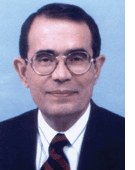 The Senate Environment and Public Works Subcommittee on Clean Air, Climate Change, and Nuclear Safety held an oversight hearing today to examine the regulatory processes for new and existing nuclear plants. The full NRC Commission presented testimony before the subcommittee. Subcommittee Chairman Voinovich and the other senators on the committee praised NRC Chairman Nils Diaz, left, on his 10 years of service on the commission and his three years as chairman. Chairman Diaz is retiring to Tampa, Florida. Senators expressed the hope that Mr. Diaz would continue to serve in some capacity, possibly as a consultant, because of his vast experience and knowledge. After all of the compliments and farewells the commission members were aggressively questioned about the status of the nuclear industry. Senators expressed concern about maintaining the safe operation of the current nuclear reactor fleet while the industry is pursuing renewed building. There was also much concern about NRC's in-house capability to manage up to 18 applications for new reactors.
The Senate Environment and Public Works Subcommittee on Clean Air, Climate Change, and Nuclear Safety held an oversight hearing today to examine the regulatory processes for new and existing nuclear plants. The full NRC Commission presented testimony before the subcommittee. Subcommittee Chairman Voinovich and the other senators on the committee praised NRC Chairman Nils Diaz, left, on his 10 years of service on the commission and his three years as chairman. Chairman Diaz is retiring to Tampa, Florida. Senators expressed the hope that Mr. Diaz would continue to serve in some capacity, possibly as a consultant, because of his vast experience and knowledge. After all of the compliments and farewells the commission members were aggressively questioned about the status of the nuclear industry. Senators expressed concern about maintaining the safe operation of the current nuclear reactor fleet while the industry is pursuing renewed building. There was also much concern about NRC's in-house capability to manage up to 18 applications for new reactors.It was a lively hearing, particularly when Senator Hillary Clinton questioned the commission on the status of dirty bomb materials monitoring. The commission has proposed transferring oversight to the states instead of establishing monitoring at the NRC. Senator Clinton was very concerned about this recommendation. Kevin Book, VP with Friedman, Billings, Ramsey & Co (FBR) gave a sobering statement about the requirements of Wall Street to invest in nuclear power. He basically stated that nuclear is in competition with any of a number of other portfolio categories that investors might invest in, depending strictly on the return. He made it clear that even under the best of circumstances, nuclear power will be a risky investment because of the new reactor technology being used and the possibility of delays (for whatever reason).
There was a similar hearing on the House side earlier this week (See NEI Nuclear Notes)
No comments:
Post a Comment